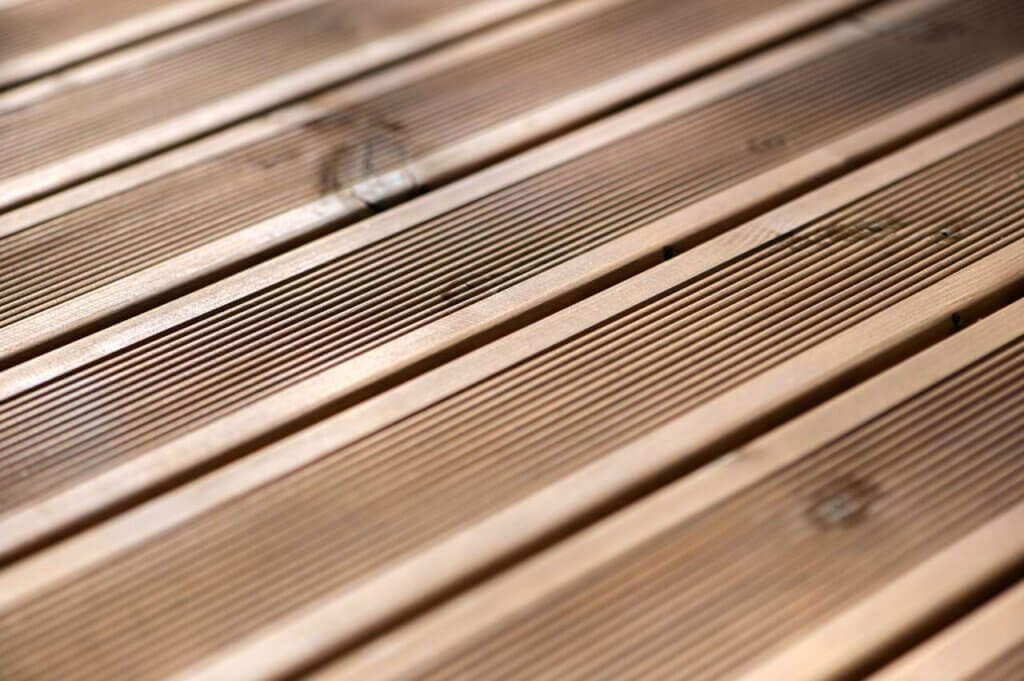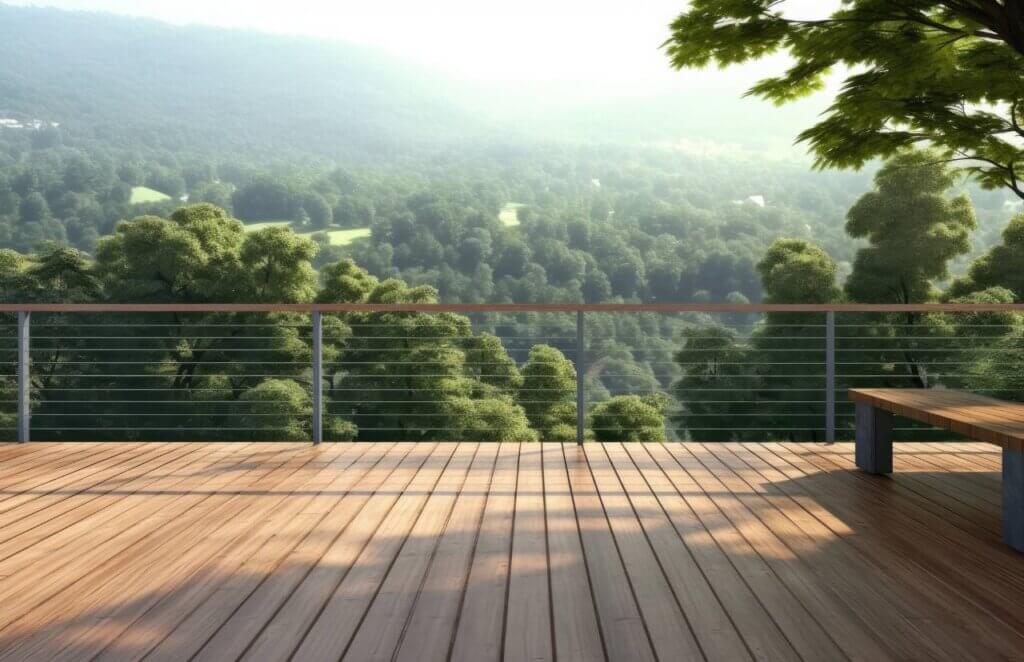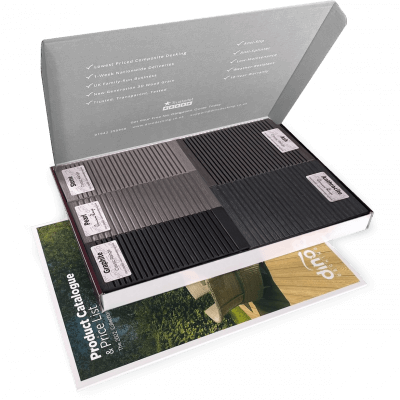Glass Balustrade Installation: The Complete Guide
Installing glass balustrade can be an ideal way to add safety and style to an existing deck, walkway or other
Products in Stock
Lowest Prices
Express Delivery
10-Year Warranty
February Sale. Up To 15% Off.

Thinking about building a deck? Great idea! There’s nothing quite like having your own outdoor space for those sunny afternoons or pleasant evenings. But now you’re faced with a big decision: composite decking or wood decking? Both have their merits, but which one’s right for you?
Don’t worry, we’re here to break it down for you. By the time you finish reading this, you’ll have all the information you need to make the best choice for your dream deck. Let’s dive in!
Let’s start with explaining what composite decking is: this modern material is made from a mix of recycled wood fibres and plastic, and is well-known for being tough, low-maintenance, and environmentally friendly.
Composite decking has been gaining popularity rapidly in recent years, and it’s not hard to see why: it offers the look of wood decking without the constant upkeep. Plus, it comes in a variety of colours and finishes, so you can get creative with your outdoor space.
Now, let’s talk about wood decking: this has been the go-to choice for decks for a very long time, and there are a lot of traditional wood types for decking that provide an undeniable appeal of the natural grain and warmth of real wood under your feet.
Wood decking typically comes in two main types: softwoods like pine or cedar, and hardwoods like oak or ipe. Each has its own unique characteristics, from colour to durability, and while they all have their own appeal, everyone has their own preference.
| Factor | Composite | Wood |
|---|---|---|
| Cost | ⭐⭐⭐⭐ Expensive initially Saves money over time |
⭐⭐⭐⭐ Cheap initially Requires repairs over time |
| Durability | ⭐⭐⭐⭐ Very durable |
⭐⭐⭐ Can be durable with correct preparation |
| Installation | ⭐⭐⭐⭐ Easy to install Requires little extra effort |
⭐⭐ Complicated to install Requires sanding, sealing, staining, and painting |
| Maintenance | ⭐⭐⭐⭐⭐ Very low-maintenance |
⭐⭐⭐ High-maintenance |
| Sustainability | ⭐⭐⭐⭐⭐ Very sustainable |
⭐⭐⭐⭐ Sustainable if sourced from sustainably sourced timber |
| Stability | ⭐⭐⭐⭐ Can be slippy when wet |
⭐⭐⭐⭐ Can be slippy when wet |
| Customisation | ⭐⭐⭐⭐⭐ Comes in a variety of colours and styles |
⭐⭐⭐⭐ Many options available to fit a natural style |
Let’s talk about costs. When it comes to initial expenses, costs for decking boards can vary in the UK, but wood decking often has the advantage; whilst hardwoods can be pricey, it’s generally cheaper to buy and install softwoods than composite decking, with most traditional softwood decking boards selling at around £10-15 per square metre, whereas composite decking boards can be anywhere from Dino Decking’s affordable £47.98 per square metre all the way up to £68 per square metre.
However, due to wood’s susceptibility to splintering, warping, and moulding, wood requires more maintenance, which can increase costs over time. Composite decking, on the other hand, might cost more upfront, but thanks to its low maintenance requirements, you’ll likely save on money and effort in the long run, making it an investment that can pay off over time.
If you’re curious about specific prices, check out our best composite decking prices in the UK. We’ve got options to suit every budget without compromising on quality.
When it comes to toughness, composite decking is the clear winner; it’s resistant to rot, warping, and insect damage. Plus, it doesn’t splinter, making it a great choice for families or young homeowners that have kids or pets running around. Don’t believe us? Order a composite decking sample pack and see for yourself.
Wood decking, while beautiful, is more susceptible to the elements.It can warp, crack, or rot over time, especially if not properly maintained. But with the right care, a wood deck can last for decades and age beautifully, developing a rich patina that many people love.
In the debate of composite decking vs wood, there is no argument that installing composite decking is much easier than wood. Most composite decking comes designed to be assembled, with no need for screws. The grooves of composite decking boards fit together easily to create a seamless look that you can do yourself quickly and easily, perfect for those who don’t have the knowhow to construct a deck by themselves and don’t want the hassle of getting a professional in.
Wood decking however can be a bit trickier to install. Whilst very possible to do it yourself, wood requires a lot more effort to ensure it’s stable and ready. On top of fixing it with screws, you need to sand, seal, stain, and paint it before it’s ready to enjoy, so it’s great for DIY enthusiasts that love a challenge.
Again, composite decking’s dense composition and sturdy design makes it a clear choice for a low-maintenance, high-quality decking.It’s the perfect option for busy homeowners or those who’d rather spend their weekends relaxing on their deck rather than working on it. A quick sweep and occasional wash is all the composite decking maintenance you need to keep your deck looking fresh and polished..
On the other hand, wood decking requires more regular care; you’ll need to clean it regularly, re-seal or re-stain it every few years, and keep an eye out for any boards that need replacing. In short, it needs consistent attention to keep it in top shape.

In this day and age, environmental impact is an important factor to consider. When it comes to being planet-friendly, composite decking is often sustainable and made using recycled materials, which is a big plus, and it also doesn’t require the use of harmful stains or sealants.
That said, traditional wood decking can still be an environmentally friendly choice if you opt for sustainably sourced timber. However, the treatments and stains used on wood can have a negative environmental impact.
Also Read: Composite Decking vs. PVC
Once you’ve built a deck, you want to be assured that you can use it without injuring yourself. The good news is that both composite decking and wood decking have similar structural integrities and resistances to slipping.
Composite decking is actually slightly less slippery than wood when dry, but this can change when it gets wet. To avoid slipping at all, consider buying grooved boards. Grooved boards increase the friction of the boards, meaning they become less slippery so you can enjoy your beautiful deck whether you’re having a snowball fight in winter or sunbathing in summer.
When it comes to customisation, it’s really down to personal preference. Composite decking has a wider range of colours and styles to choose from which many appreciate, but if you’re looking for the natural look and feel of wood beneath your feet, then it might be worth investing in the extra effort of traditional wood.
Similarly, if you prefer the modern, chic look of a smooth deck or like the idea of choosing from a range of colours that may not be available in natural woods, go for the composite decking.
Budget is often a deciding factor for many people, so you should consider the cost of composite decking vs wood decking. Think about not just the initial cost, but also the long-term expenses. Wood might be cheaper upfront, but composite could save you money in the long run.
At the end of the day, it’s your deck. Do you love the look and feel of natural wood? Or do you prefer the low-maintenance, consistent appearance of composite? There’s no wrong answer here – it’s all about what suits you best.
And if you need some inspiration? Check out our decking ideas you need to know to help you get creative.
Consider how you’ll use your deck. If it’s going to see a lot of foot traffic, or if you’ve got kids and pets running around, the durability of composite decking might be your best bet over wood. But if you’re after a quieter, more natural space, wood could be perfect.
All in all, the option of composite decking vs wood decking isn’t always straightforward, but we hope this guide has helped clarify things for you. Both options have their strengths, and the right choice depends on your specific needs, preferences, and circumstances.
If you like the sound of composite decking for your new decking project, explore our full range and begin building the deck of your dreams! Whether you need more advice, want to see some decking samples, or are ready to place an order, don’t hesitate to get in touch. Let’s make your dream deck a reality!

Our sample pack contains a sample piece of each colour currently available. Order your free sample pack today to compare the colours and get a true feeling of the Dino Decking range!
Installing glass balustrade can be an ideal way to add safety and style to an existing deck, walkway or other
Composite decking is far more resistant to damp, rot, mould and warping than traditional timber decking, but it is still